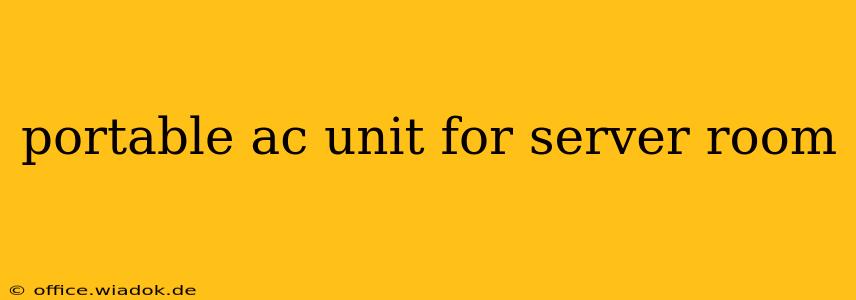Maintaining optimal temperature in a server room is critical for preventing costly downtime and data loss. While traditional HVAC systems are the gold standard, portable AC units offer a flexible and often more cost-effective solution, especially for smaller server rooms or temporary setups. This guide explores the key factors to consider when choosing a portable AC unit for your server room, ensuring your valuable data stays safe and sound.
Understanding the Cooling Needs of Your Server Room
Before diving into specific portable AC units, accurately assessing your server room's cooling requirements is paramount. Consider these factors:
- Server Room Size: The cubic footage of your room directly impacts the BTU (British Thermal Unit) rating you'll need. Larger rooms require higher BTU units to effectively cool the space.
- Heat Output of Servers: The number and type of servers, along with their power consumption, determine the amount of heat generated. Consult your server specifications for precise heat output data.
- Ambient Temperature: External temperatures influence the workload of your cooling system. Higher ambient temperatures necessitate a more powerful AC unit.
- Insulation and Air Leakage: A well-insulated room with minimal air leakage requires less cooling power compared to a poorly insulated space.
Key Features to Look for in a Portable AC Unit for Server Rooms
Choosing the right portable AC unit involves more than just BTU rating. Pay close attention to these critical features:
1. BTU Rating: Finding the Right Cooling Power
The BTU rating indicates the unit's cooling capacity. Underestimate this, and your servers will overheat; overestimate, and you'll waste energy and money. Online BTU calculators can help determine the appropriate rating based on your server room's dimensions and heat load.
2. Energy Efficiency (EER/SEER): Saving Money on Energy Bills
Energy efficiency is crucial for long-term cost savings. Look for units with high Energy Efficiency Ratio (EER) or Seasonal Energy Efficiency Ratio (SEER) ratings. These ratings indicate how efficiently the unit converts energy into cooling power.
3. Noise Levels: Minimizing Disruption
Server rooms often require quiet operation. Check the decibel rating (dB) of the unit. Lower dB ratings indicate quieter operation, minimizing disruption to your working environment.
4. Exhaust System: Efficient Heat Removal
The unit's exhaust system should effectively remove the hot air from the server room. Consider units with flexible exhaust hoses for convenient placement.
5. Built-in Features: Added Convenience and Control
Some portable AC units offer features like programmable timers, thermostats, and remote controls, enhancing convenience and allowing for precise temperature control.
6. Reliability and Durability: Ensuring Long-Term Performance
Opt for units from reputable manufacturers known for their reliability and durability. Investing in a high-quality unit minimizes the risk of breakdowns and ensures long-term performance.
Installation and Maintenance Considerations
Even portable AC units require proper installation and regular maintenance for optimal performance:
- Placement: Ensure adequate ventilation around the unit and that the exhaust hose is properly routed to expel hot air outside the server room.
- Regular Cleaning: Clean the filters regularly to maintain efficiency and prevent dust buildup.
- Professional Servicing: Schedule regular professional servicing to identify and address potential issues early on.
Conclusion: Choosing the Best Portable AC Unit for Your Server Room
Selecting the right portable AC unit for your server room involves careful consideration of your cooling needs, budget, and desired features. By focusing on BTU rating, energy efficiency, noise levels, and overall reliability, you can ensure your servers operate at optimal temperatures, preventing costly downtime and safeguarding your valuable data. Remember to always consult with a qualified HVAC professional for personalized advice tailored to your specific server room environment.

